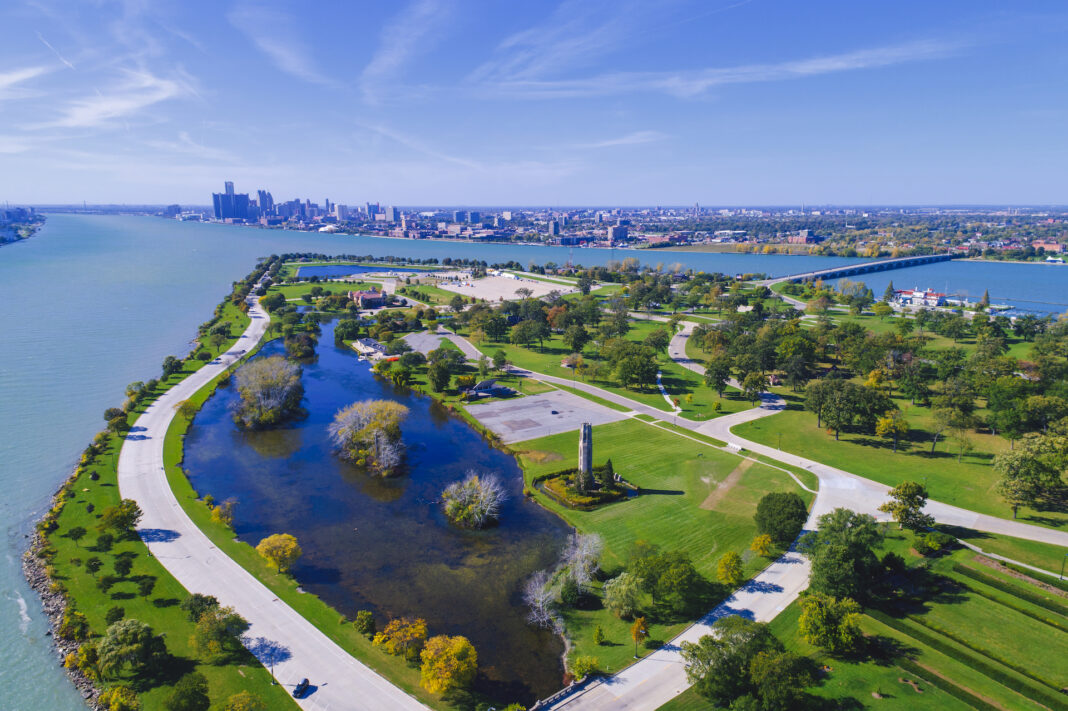
Michigan’s diverse economy heavily relies on the automotive industry, with its largest city, Detroit, known as the car capital of the world. It is the only state in the U.S. to consist of two peninsulas, so many of its cities are close to the water, appealing to outdoor enthusiasts and those who want to reside on the waterfront or water-adjacent property. The Straits of Mackinac is a five-mile channel that separates the two peninsulas and connects Lake Huron to Lake Michigan.
How expensive is an apartment in Michigan?
The cost of living in Michigan is slightly lower than the national average, making it an affordable place to live. The average rent for a studio apartment is around $600 per month, while a one-bedroom costs an average of $700 in the state. If you need more space, a two-bedroom apartment may cost you around $900 per month, while a three-bedroom apartment jumps up to nearly $1,200 per month. A four-bedroom apartment costs an average of $1,300 per month.
Certain cities are more expensive than others within the state of Michigan. Ann Arbor is one of the more expensive cities in the state, with the average monthly rent coming in at $1,175 per month. The higher cost of housing in this city isn’t too surprising, as it’s the location of the University of Michigan. Higher demand, taxation laws, and zoning rules all factor into the higher cost of living in this part of Michigan.
Among the larger cities in the state, Detroit comes in on the lower end of rent prices. The average monthly rent in Detroit is $975, while Grand Rapids renters pay an average of $1,098 per month. Sterling Heights is more expensive, averaging nearly $1,400 per month in rent, while Warren rent averages at around $1,200 per month. If you live in one of the smaller cities or rural areas of the state, you can expect to pay less in rent.
One factor contributing to the fluctuation in rental prices in the state is the large percentage of home-ownership. Nearly 70% of Michigan residents own a home — one of the highest rates in the country. Ann Arbor has the highest home prices, with the median price coming in at $416,000. Detroit’s median home price is about one-tenth of that cost at $48,100, while the statewide median home price is $161,000.
How do I find cheap apartments in Michigan?
Since the cost of living in Michigan is lower than many of its surrounding states, you can likely find an apartment that fits your budget. You can review apartments available for rent in the various Michigan cities on Zumper, where it’s easy to filter your search and find the place that fits your needs.
Location will factor into what you pay for rent, so if you want to lower your housing costs, you may need to be flexible in where you live. As mentioned, Ann Arbor is the most expensive city in the state. If you’re planning to attend the University of Michigan, you could look into living in one of the nearby suburbs or towns and commute to school, rather than paying more for an apartment that’s close to campus.
You can further lower your housing costs by living with roommates and sharing an apartment that includes multiple bedrooms. The average cost of a two-bedroom apartment in the state is $900, which means you and one roommate would each pay $450 in rent. This amount is cheaper than the average studio apartment, which costs around $600 per month, and a one-bedroom apartment that costs an average of $700 per month.
What is the cheapest rent in Michigan?
The rent prices vary throughout the state of Michigan. In some smaller cities and rural areas, you may be able to rent a small single-family house for the same price as you’d pay for a studio or one-bedroom apartment in another area. Larger cities, such as Detroit, have more apartments for rent. If you want to live in the heart of downtown Detroit, you can expect to pay more.
As you create your budget for living in Michigan, it’s helpful to include some of the other costs that you may be responsible for in your rental. Many landlords require renters to pay for electricity and gas, while additional potential monthly costs include water, garbage, sewer, and internet service.
How does Michigan compare to other states?
The cost of living in Michigan is slightly lower than the national average, which includes housing costs, food, health care, transportation, and other factors. The average housing costs are about 65% of the national average, although transportation costs are higher at 115% of the national average.
Those living in the state can expect to pay more for utilities, as gas and electricity are slightly more expensive in Michigan. According to a U.S. Energy Information Administration report, the average monthly energy bill in Michigan was $97.41. You can lower your energy bills by reducing your usage or sharing your home with a roommate and splitting the cost of the utilities.
The state of Michigan has a flat income tax rate of 4.25%. Each city adds its own taxes for residents living within its limits, which can take the rate up to 6.65%. The property tax rate in the state is the ninth-highest in the nation at 1.71%, which can affect rental prices as well. The base sales tax rate is 6% and counties do not add onto that rate, so regardless of what city or county you live in, you’ll pay the same sales tax rate on applicable purchases.
Michigan offers beautiful natural surroundings, access to the water, and plenty of appealing amenities, all with a lower cost of living than the national average. It’s an appealing place to live, especially for those working in the industries that thrive in this part of the country.
Get started on your apartments search. Browse thousands of apartments for rent all over Michigan on Zumper.



